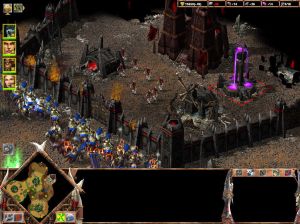Let’s try an experiment. I’m going to name a game studio, and you tell me the first thing that comes to mind. Ready?
Kojima Productions. BioWare. Grasshopper Manufacture.
If your answers were along the lines of “Metal Gear Solid,” “dialogue-driven role-playing games,” and “messed-up crazy shit,” respectively, you have just encountered a powerful force in all creative endeavors: typecasting.
Doing something well is both good and bad. Gamemakers want to succeed, but they also run the risk of people expecting them to keep doing the same thing. Or, worse still, people might think they can only do the type of game that made them famous, which makes it harder for them to sell something else to a publisher.
I spoke with three developers about these issues and others, and here’s what they had to say.
Orb Interactive
Orb is an independent developer made up of veterans of the ill-fated TimeGate Studios. That production house shut down in fall of 2013 after the release of Aliens: Colonial Marines, a much-maligned title with a complicated — and possibly scandalous — development history.

Above: Yikes.
But before all of that bad business, TimeGate was known for its work on first-person shooters (FPS). It created Section 8 and its sequel, Section 8: Prejudice, as well as two expansions for developer Monolith’s horror-themed F.E.A.R. series.
Orb appeared, and its first project was not a first-person shooter but a multiplayer online battle arena (MOBA) game called Decimal. I spoke to two of the cofounders, Phillip Morales and Enrique Pina, about starting up their new company and breaking into an unfamiliar genre alongside established, mega-popular games like developer Riot Games’ seemingly unstoppable League of Legends.

Above: TimeGate started out with real-time strategy games like Axis and Allies and the Kohan series.
“We actually did start in real-time strategy,” Morales said. “That’s where we cut our teeth.”
“It’s funny, because even switching to FPS at the beginning was difficult,” Pina added. “All the publishers were like, ‘What do you know?’ You almost have to prove yourself any time you have interest in another genre, it’s like ‘Well, what do you know about that?'”
With Decimal, Orb was returning a bit to where it started; the game is not a real-time strategy title, but it is definitely not the kind of first-person shooter that TimeGate became known for. It was a gamble that didn’t pay off, as the project failed to reach its goal in its Kickstarter crowdfunding campaign last September, raising just $29,000 of its $500,000 goal.
“We were like, ‘Man, we’re counting on [MOBA fans] to fund us.'” Morales says. “These are some of the most die-hard players there are. We have to give them something really, really good if we’re going to pry them away from what they’re playing already.
“And we learned a lot from the Kickstarter because we didn’t succeed well enough. Or maybe we didn’t try the right tactics, or whatever. We knew going in that MOBA players are hardcore in a different kind of way. Very protective of MOBAs. [Laughs] Those guys. I hate to say ‘those guys,’ because, you know, I’m one of them, too.”

Above: Decimal takes place in a ruined, sci-fi cityscape that you will then ruin further.
“What we were hoping was gonna happen,” Pina said, “is that we were trying to offer something different. Not a slight variation of what they were playing or something like that. We were trying to make it so the experience itself was different. And that’s why we specifically chose, even, science fiction. It’s like, ‘Hey, this is something different. Give it a chance; it’s not gonna be like what you’re used to.'”
“And even changing the genre would hopefully allow for that flip of the switch for like, ‘Let me change my mindset. This is gonna not feel like this other game I was playing. This is different.’ Even after the genre, we were constantly thinking of how we were gonna maybe open that door a little bit. Because basically, you are having to steal players over from one area to what we were trying to offer.”
Orb has temporarily shelved Decimal while it works on a few other projects. One is a music-player app called Chipmunk Funk, and the other is a first-person shooter called TraVR that uses the full-body Virtuix Omni virtual-reality “treadmill.” But Morales doesn’t see this as a step back or a return to safety.
“I still wanna keep the door open that if somebody came and said, ‘Hey, I have a great idea for a shooter,’ I would never wanna say ‘Nah, kid, we’re a MOBA house now,'” he says. “What I would like to be known as, is we’re a fuckin’ fun game house. We make good games. That’s how I would like to dictate everything we do in our studio. That no matter what kind of game we make, it’s just fun and creative.”
“It’s really exciting for us, to be able to break out and just try different stuff,” Pina adds. “And the idea that we can’t or we shouldn’t, because we’ve never done something like that, that’s never crossed our minds as to why we shouldn’t.
“You just go figure it out. Somebody else went and figured it out. They’re smart, we’re not dumb. We can go and figure it out, too. We did it for the RTSes, and there was not a single person in that building who had ever made an RTS before we made one. Or a game, for that matter, like literally not a single person there had even made a game. They said we couldn’t do it in FPSes, and we figured it out. And we can figure this out, too.”

